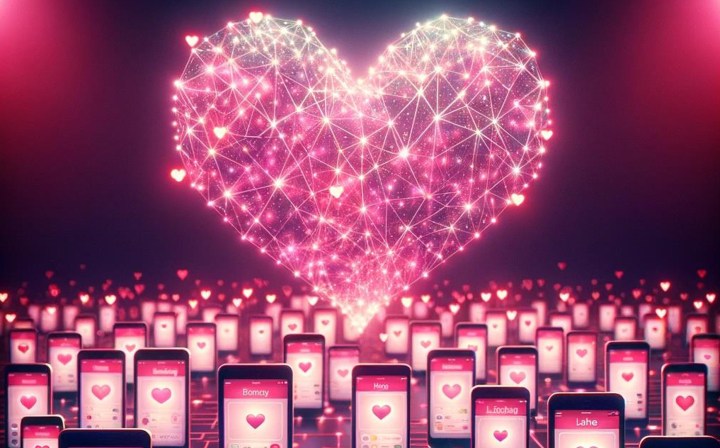DIGITAL DATING OP-ED
Love in the age of AI — the good, the bad and the artificial

Can algorithms truly capture the complexities of human attraction and compatibility, or do they reduce love to a series of data points and calculations? We explore the strange world of online dating apps.
Love is in the air, and with Valentine’s Day upon us, hearts are aflutter as singles and couples alike gear up for the most romantic day of the year. Today, finding love has become as simple as a swipe of a finger and with the advent of dating apps, meeting potential partners has never been easier. In the digital age, Cupid’s arrow is guided not just by fate, but by the algorithms of dating apps, where swipes and matches lead to modern-day love stories.
However, behind the convenience lies a complex web of algorithms and artificial intelligence (AI) that shapes our romantic interactions. As roses are ordered, chocolates are wrapped and dinner reservations are made, we at the Campaign on Digital Ethics (Code) have delved into the world of AI on dating apps, exploring the good, the bad and the downright ugly.
The good
AI on dating apps has revolutionised the way that we connect with others, offering many benefits for users. As of February 2024, the most popular dating apps in South Africa include Badoo, Tinder, Dating and Chat and Bumble.
At the 2023 Code Conference, the founder and CEO of Bumble, Whitney Wolfe Herd, spoke about how the company has been using AI for years for moderation, recommendation and the verification of photos. One of AI’s most significant advantages in this space is its ability to match individuals based on compatibility metrics and preferences. Sophisticated algorithms analyse user data, including interests, location and relationship goals, to suggest potential matches that align with each user’s unique criteria. This targeted approach increases the likelihood of finding a compatible partner, saving users time and effort in their search for love.
AI-powered features enhance the user experience by providing personalised recommendations and improving the quality of matches over time. Machine-learning algorithms continuously adapt to user behaviour, refining their suggestions based on interactions and feedback. This iterative process ensures increasingly relevant matches, fostering meaningful connections and reducing the frustration of sifting through countless profiles.
Moreover, AI-driven chatbots and virtual assistants streamline communication between users, offering helpful prompts and suggestions to initiate conversations and keep them flowing. These tools help to alleviate social anxiety and facilitate smoother interactions, particularly for shy or introverted individuals. By breaking down barriers to communication, AI has empowered some users to engage more confidently and authentically, fostering genuine connections and a sense of intimacy.
The bad
Despite its many advantages, AI on dating apps is not without its drawbacks. One of the most significant concerns is the potential for algorithmic bias and discrimination. AI systems rely on vast amounts of data to make predictions and decisions, but this data is not always representative or unbiased. Biases inherent in the data, such as race, gender or socioeconomic status, can be perpetuated and even amplified by AI algorithms, leading to unfair treatment and discrimination against certain demographics.
The gamification of dating, with its emphasis on swiping and superficial judgements, can foster a culture of objectification and detachment.
For example, studies have shown that dating apps may exhibit racial biases in matchmaking, favouring users of certain ethnicities over others. This perpetuates societal stereotypes and reinforces existing inequalities, undermining the principles of fairness and equality. Additionally, AI algorithms may inadvertently reinforce narrow beauty standards, prioritising users based on physical appearance rather than personality or compatibility.
Furthermore, the commodification of relationships on dating apps can lead to shallow and transactional interactions, where individuals are reduced to mere profiles and statistics. The gamification of dating, with its emphasis on swiping and superficial judgements, can foster a culture of objectification and detachment, detracting from the genuine human connections that dating should entail. A rising phenomenon known as the online dating effect has seen online daters disproportionately reporting higher levels of dissatisfaction and instability in their relationships compared with their offline counterparts.
The ugly and artificial
Perhaps the most concerning aspect of AI on dating apps is the potential for misuse and exploitation. As algorithms become increasingly sophisticated, so too do the tactics employed by scammers and malicious actors. From catfishing to phishing scams, users are vulnerable to a wide range of romance scams and deceptive practices designed to manipulate and defraud them. Cyber security company Arkose Labs reported that between January 2023 and January 2024 there was a 2,087% increase in bot attacks on dating apps.
Additionally, the collection and analysis of user data by dating apps raise significant privacy concerns. Personal information shared on these platforms, including preferences, messages and location data, can be exploited for targeted advertising or sold to third parties without users’ consent. This erosion of privacy undermines trust and autonomy, leaving users feeling vulnerable and exposed.
With business models continuously being adapted to monetise loneliness… AI is being deployed to get their user base to part with their money and keep the user hooked on their apps.
Last, the reliance on AI algorithms for matchmaking raises questions about the nature of human relationships and the role of technology in mediating intimacy. Can algorithms truly capture the complexities of human attraction and compatibility, or do they reduce love to a series of data points and calculations? The increasing reliance on technology in matters of the heart threatens to erode the spontaneity and serendipity that make romance so thrilling and unpredictable.
Read more in Daily Maverick: 2023 was the year of generative AI. What can we expect in 2024?
Ultimately, one must bear in mind that dating sites, although originally intended to help you find love, are ultimately for-profit entities which stand to lose two customers every time a successful match is made. With business models continuously being adapted to monetise loneliness, such as by selling upgrades and premium app subscriptions, AI is being deployed to get their user base to part with their money and keep the user hooked on their apps. AI has been used to decipher a person’s desirability and boost their profile accordingly, significantly increasing or decreasing their chances of getting matched and creating a bigger market for their premium products.
Tips for protecting yourself against dating app scammers
Part of our mission at Code is to equip you with skills that make you a responsible digital citizen, who can safely navigate through different online spaces. If you are currently on a dating app, or thinking about joining one, here are some tips to avoid the scammers and swindlers:
- Do not rush it: Love takes time and so does doing your due diligence. Take the time to build a real connection with your match, and be wary of matches who might rush the process – demanding that you share personal information such as contact details or your home address;
- Never send money: If your perfect match was as rich as they claim, they would not need your money. Swindlers on dating sites often try to scam money from their matches, under the guise of some elaborate excuse;
- Do an image search: Leverage the power of technology by uploading the profile picture of your match on Google Image Search, which will be able to help you assess whether the profile picture is real or fake;
- Look for consistency: Searching platforms such as Facebook, X and Instagram may help you spot a fake profile. If your match has no social media presence or has only recently created profiles, that could be a sign of potential danger; and
- Video call to verify: If you are satisfied that your match is genuine, initiate a video call as a final verification step. Scammers who thrive on exploiting the anonymity of the virtual world are likely to hesitate to chat via video.
To sum up, the integration of AI into dating apps has ushered in a new era of romance, offering unprecedented convenience and efficiency in finding love. However, it also raises a host of ethical, social and psychological questions that demand careful consideration. As we navigate this brave new world of digital dating, we must remain vigilant against the potential pitfalls of AI and algorithms, ensuring that technology serves to enhance rather than detract from our quest for love and connection. DM
Zanele Fengu is an activist, legal researcher, and consultant for the Campaign On Digital Ethics.




















Comments - Please login in order to comment.